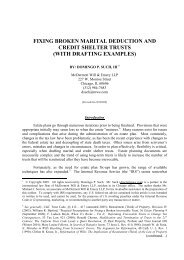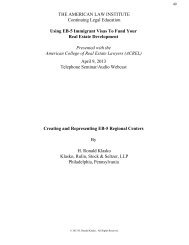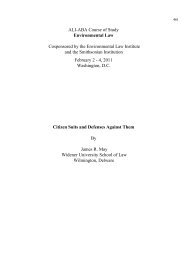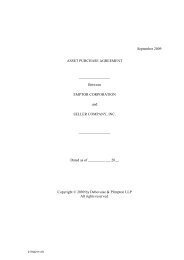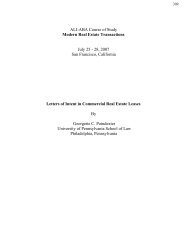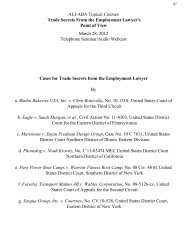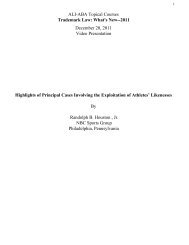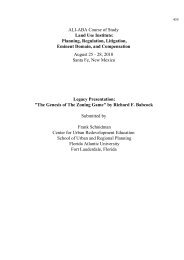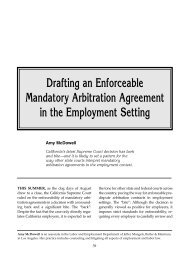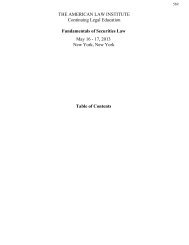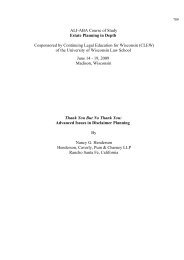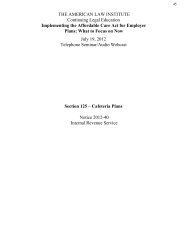executive employment contracts including non ... - ALI CLE
executive employment contracts including non ... - ALI CLE
executive employment contracts including non ... - ALI CLE
You also want an ePaper? Increase the reach of your titles
YUMPU automatically turns print PDFs into web optimized ePapers that Google loves.
consideration, (2) an employee who signed an <strong>employment</strong> agreement eleven daysafter he began <strong>employment</strong> had not received adequate consideration, and(3) employees who began <strong>employment</strong> and were then, within the first one or twoweeks, required to sign restrictive covenants did not receive adequate consideration.2.North Carolina. In James C. Greene Co. v. Kelley, 134 S.E.2d 166 (N.C. 1964), theNorth Carolina Supreme Court found that there was inadequate consideration tosupport a restrictive covenant entered into one year after the beginning of<strong>employment</strong>, despite the employee's continued <strong>employment</strong> in fact with periodicsalary increases. This case was followed in Worth Chem. Corp. v. Freeman, 136S.E.2d 118 (N.C. 1964) (agreement signed 15 days after commencement of<strong>employment</strong> not supported by new consideration), and Engineering Assocs., Inc. v.Pankow, 150 S.E.2d 56 (N.C. 1966) (agreement signed three and one-half yearsafter commencement of <strong>employment</strong> not supported by new consideration). See alsoKadis v. Britt, 224 N.C. 154, 29 S.E.2d 543 (1944). See also The Reynolds &Reynolds Co. v. Tart, 955 F. Supp. 547, 553 (W.D.N.C. 1997) ("Assuming that theDefendants were employed before they signed their agreements, continued<strong>employment</strong> under unchanged terms cannot have provided consideration for theirwritten promises not to compete.") But see Whittaker General Med. Corp. v. Daniel,362 S.E.2d 302 (N.C. Ct. App. 1987), rev'd on other grounds, 379 S.E.2d 824(N.C.), cert. denied, 384 S.E.2d 531 (N.C. 1989) (a promise of promotion, grant ofpromotion or change in compensation from salary to commission constitutes valuableconsideration to support a <strong>non</strong>competition agreement).3.Ohio. In Morgan Lumber Sales Co. v. Toth, 41 Ohio Misc. 17, 321 N.E.2d 907 (1974),the Common Pleas Court of Franklin County, Ohio, held that a restrictive covenantsigned several months after the beginning of <strong>employment</strong> was solely for the benefitand protection of the employer and hence not supported by consideration. See alsoEtna Prods. Inc. v. Stofey, No. 953, 1981 WL 3784 at *3 (Ohio Ct. App. Sept. 28,1981). But see Avery Denison Corp. v. Kitsonas, 118 F. Supp. 2d 848, 851-52(S.D. Ohio 2000) (discussing the split among Ohio appellate courts as to whethercontinued <strong>employment</strong> after employee signs restrictive covenant is sufficientconsideration).4.Oregon. In McCombs v. McClelland, 354 P.2d 311 (Or. 1960), the Oregon SupremeCourt held that a continuing <strong>employment</strong> relationship was insufficient consideration fora restrictive covenant entered into approximately ten years after the employee beganwork. The court stressed that there was neither an express nor an implicit promise ofcontinued <strong>employment</strong> because the employer had not made signing the agreement acondition of future <strong>employment</strong>. But see Mail-Well Envelope Co. v. Saley, 497 P.2d364 (Or. 1972) (holding that where employee received salary increase underagreement, consideration was neither nominal nor grossly inadequate or in its termsotherwise unfair). In addition, note that Title 51 Or. Rev. Stat. § 653.295 allowsenforcement of restrictive covenants in <strong>employment</strong> agreements which are not entered- 36 -




